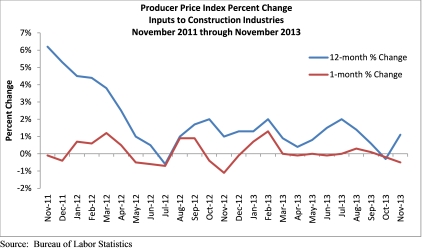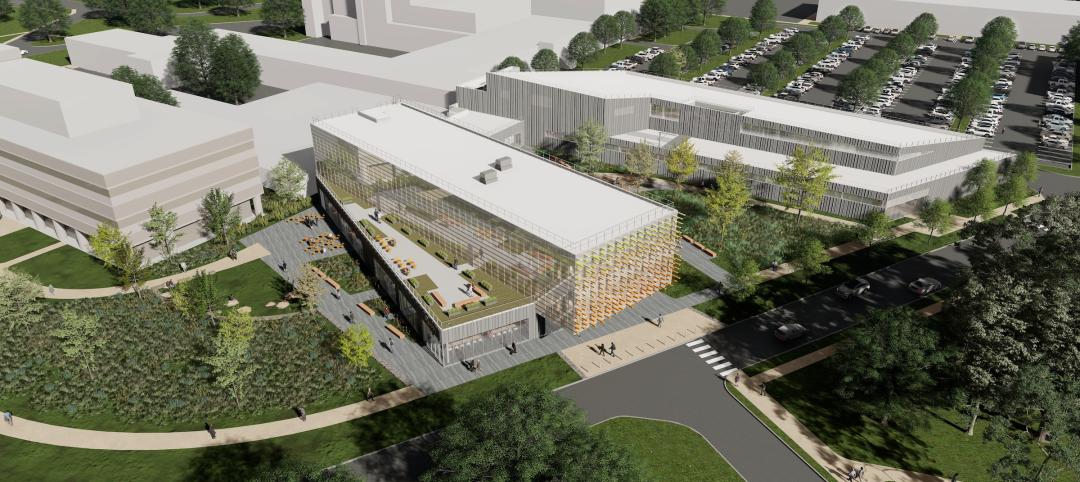Overall, construction materials prices fell 0.5 percent in November and are up only 1.1 percent year over year, according to the Department of Labor’s Dec. 13 Producer Price Index. Nonresidential construction materials are down 0.6 percent for the month and are 0.7 percent lower than the same time last year.
“November represented another month of remarkable stability for construction input prices,” said Associated Builders and Contractors (ABC) Chief Economist Anirban Basu. “Although many investors predicted significant inflation this year due to expansionary monetary policies in much of the developed world, there continues to be a lack of significant inflationary pressures both globally and nationally.”
Overall, the nation’s wholesale goods prices expanded 0.2 percent in November, but are down 0.9 percent year over year.
“Next year is unlikely to offer as much stability as 2013,” Basu said. “Global economic growth is set to accelerate and the apparent budget deal in Congress should produce greater certainty among businesses, helping improve an already benign national economic forecast. Tension in the Middle East also continues to be a consideration. Together, these factors suggest materials price increases may be at least slightly more rapid in 2014.”
THE FOLLOWING MATERIALS PRICES INCREASED IN NOVEMBER:
- Fabricated structural metal products were up 0.1 percent for the month and 0.3 percent year over year.
- Softwood lumber prices increased 2.6 percent on a monthly basis and are up 12.8 percent year over year.
- Natural gas prices were up 1.9 percent for the month and 3.3 percent on an annual basis.
- Nonferrous wire and cable prices rose 0.2 percent on a monthly basis and are down 3 percent year over year.
- Iron and steel prices were up 1.8 percent for the month and are down 0.1 percent compared to the same time last year.
- Prices for plumbing fixtures and fittings inched up 0.1 percent in November and are up 1.6 percent year over year.
- Steel mill products prices increased 0.8 percent in November but are down 0.6 percent compared to the same time last year.
THE FOLLOWING CONSTRUCTION INPUTS EXPERIENCED PRICE DECREASES IN NOVEMBER:
- Prepared asphalt, tar roofing and siding prices were down 3.8 percent for the month and 0.3 percent year over year.
- Crude petroleum prices fell 10.3 percent on a monthly basis but are up 0.9 percent year over year.
- Crude energy prices decreased 5.7 percent in November but are up 0.6 percent compared to the same time last year.
- Concrete products prices were flat in November and are up 2.8 percent year over year.
Related Stories
Women in Design+Construction | May 28, 2024
Commerce Department launches Million Women in Construction Community Pledge
The U.S. Department of Commerce launched its Million Women in Construction Community Pledge this month to boost the ranks of women in construction companies. Federal investments are creating a construction boom that is increasing job opportunities for construction and trade workers.
Laboratories | May 24, 2024
The Department of Energy breaks ground on the Princeton Plasma Innovation Center
In Princeton, N.J., the U.S. Department of Energy’s Princeton Plasma Physics Laboratory (PPPL) has broken ground on the Princeton Plasma Innovation Center (PPIC), a state-of-the-art office and laboratory building. Designed and constructed by SmithGroup, the $109.7 million facility will provide space for research supporting PPPL’s expanded mission into microelectronics, quantum sensors and devices, and sustainability sciences.
MFPRO+ News | May 24, 2024
Austin, Texas, outlaws windowless bedrooms
Austin, Texas will no longer allow developers to build windowless bedrooms. For at least two decades, the city had permitted developers to build thousands of windowless bedrooms.
Resiliency | May 24, 2024
As temperatures underground rise, so do risks to commercial buildings
Heat created by underground structures is increasing the risk of damage to buildings, recent studies have found. Basements, train tunnels, sewers, and other underground systems are making the ground around them warmer, which causes soil, sand, clay and silt to shift, settle, contract, and expand.
Sports and Recreational Facilities | May 23, 2024
The Cincinnati Open will undergo a campus-wide renovation ahead of the expanded 2025 tournament
One of the longest-running tennis tournaments in the country, the Cincinnati Open will add a 2,000-seat stadium, new courts and player center, and more greenspace to create a park-like atmosphere.
Mass Timber | May 22, 2024
3 mass timber architecture innovations
As mass timber construction evolves from the first decade of projects, we're finding an increasing variety of mass timber solutions. Here are three primary examples.
MFPRO+ News | May 21, 2024
Massachusetts governor launches advocacy group to push for more housing
Massachusetts’ Gov. Maura Healey and Lt. Gov. Kim Driscoll have taken the unusual step of setting up a nonprofit to advocate for pro-housing efforts at the local level. One Commonwealth Inc., will work to provide political and financial support for local housing initiatives, a key pillar of the governor’s agenda.
Building Tech | May 21, 2024
In a world first, load-bearing concrete walls built with a 3D printer
A Germany-based construction engineering company says it has constructed the world’s first load-bearing concrete walls built with a 3D printer. Züblin built a new warehouse from a single 3D print for Strabag Baumaschinentechnik International in Stuttgart, Germany using a Putzmeister 3D printer.
MFPRO+ News | May 21, 2024
Baker Barrios Architects announces new leadership roles for multifamily, healthcare design
Baker Barrios Architects announced two new additions to its leadership: Chris Powers, RA, AIA, NCARB, EDAC, as Associate Principal and Director (Healthcare); and Mark Kluemper, AIA, NCARB, as Associate Principal and Technical Director (Multifamily).
MFPRO+ News | May 20, 2024
Florida condo market roiled by structural safety standards law
A Florida law enacted after the Surfside condo tower collapse is causing turmoil in the condominium market. The law, which requires buildings to meet certain structural safety standards, is forcing condo associations to assess hefty fees to make repairs on older properties. In some cases, the cost per unit runs into six figures.


















